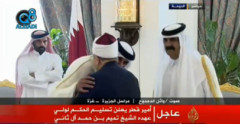
Manama: The old man was assisted by an aide as he walked up to the former and new emirs of Qatar to offer his congratulations on the peaceful transition at the top of the state and the hand-over of power.
The Emiri Court in Doha was filled with well-wishers, but Shaikh Yousuf Al Qaradawi was taken directly to Shaikh Hamad Bin Khalifa Al Thani and Shaikh Tamim Bin Hamad Al Thani, the outgoing emir and the new emir.
The father promptly moved forward and kissed the frail-looking man in a gesture that indicated the deep trust the two men have developed over the years. The scholar then moved to the son, 33, the youngest ruler of an Arab country. Shaikh Tamim planted a kiss on Al Qaradawi’s head and then his shoulder.
The images beamed live on state television immediately sparked a lively debate on social media and microblogs and questions abounded on the meaning of the gesture.
Al Qaradawi is not a regular religious scholar or a simple Friday mosque preacher.
Over the years, the Egyptian-born cleric has acquired a special status on religious, social, economic and political ideas and talks.
Doha-based Al Jazeera channel, the most viewed station in the Arab world, helped take him into the homes of millions of viewers, particularly through a weekly one-hour-long talk show in which he shared views and offered advice.
As a prominent supporter of the Muslim Brotherhood, he helped propagate their ideology and views on everything and, mainly in the last two years, on political matters.
He spoke freely about political developments in Tunisia, Libya, Egypt, Yemen and Syria and pushed his stances through the spoken word following decades of writing books.
He was clearly against former leaders Zine Al Abidine Bin Ali, Hosni Mubarak, and Muammar Gaddafi and never hesitated to show his dislike for Syrian President Bashar Al Assad, urging the use of force to oust him from power. He supported the Arab Spring and wanted a much greater role for Islamists in power.
His particularly strong stances were a source of deep contention and his powerful mixture of religion and politics earned him both admiration and contempt.
Supporters saw him as an inspiration and a guide while those who opposed him saw in him a source of division and antagonism between Muslims and other groups. Every occasion is used by both sides to amplify his “good deeds” or “misdeeds.”
The kiss by Shaikh Tamim as he was congratulated on his accession to power in the peninsular country once more became an occasion for many to draw conclusions and indulge in interpretations.
“Al Qaradawi is set to influence the new emir the way he did with the father,” Mohammad Sultan, an accountant, said. “The power of the Muslim Brotherhood is set to be strengthened in Qatar and will help fuel suspicions in other Arab countries.”
However, Ahmad Dossary, an office clerk, said that “the kiss was a matter of respect for a religious scholar, just like a salute is for a military man”.
Abu Majed, a Qatari national, said that Qataris respected Muslim scholars, especially the ones whose ideas they espouse.
“They say that we are Wahabis and reactionaries in our religious and social views, so be it,” he said. “We do like our way of life and we try to be fair to everyone. We have not changed and we do venerate our teachers, particularly those who spread Islam and Islamic values. Shaikh Tamim simply showed that he respected the man and thanked him for braving old age and physical pressure to pay his respect and show his support,” he said.
Abdullah, a Qatari businessman, said that Shaikh Tamim followed his father’s footsteps.
“The father was ostensible in paying his respects and the son duly followed,” he said. “This is part of our culture of respect for the father and for scholars, and everyone knows that Shaikh Tamim was groomed for such social roles. Maybe some people thought that Qatar would change course quickly with the son taking over, but it is obvious they do not know our culture well enough. Maybe Shaikh Tamim, by showing his respect, wanted to dismiss publicly the reports that emerged in some countries that he had stripped Al Qaradawi of his Qatari nationality and given him 48 hours to leave Doha,” he said.











